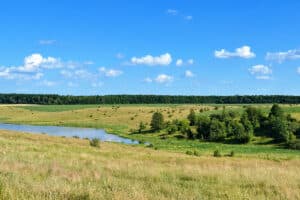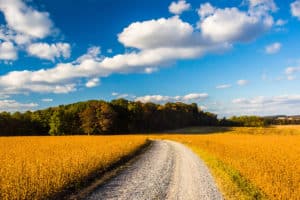The pathway to conservation easements is not always a straight line but, more often than not, is worth the trip. [Dean Saunders, ALC]
Conservation easements are powerful, effective tools available to landowners for the permanent conservation of private lands in the United States. The use of conservation easement options has successfully protected millions of acres of wildlife habitat and open space, keeping land in private hands and generating significant public benefits.
The primary purpose of a conservation easement is to give a landowner the right to protect his land from certain types of development or land use. This opportunity appeals to property owners who hold undeveloped land that is agricultural and/or has timberland, wildlife habitats, natural open space, and those with natural resources. Simply, a conservation easement is a restriction on the use of property similar to a deed restriction. It is recorded in public records and generally is in perpetuity. The government receives assurance that this valuable land will be protected from future development.
When you purchase land, you also purchase a bundle of rights. These rights include, among others, the right to develop, and the right to minerals and water. Collectively this bundle of rights is called “fee title.”
As a landowner, you also have the ability to sell some of these rights while maintaining ownership to the land. This is generally known as selling a “less-than-fee” interest. A conservation easement is a form of “less-than fee” interest and is a voluntary agreement that allows a landowner to limit the type or amount of development on their property while retaining private ownership of the land.
When you choose to give up some of these rights, by either donation or sale, you are compensated. The more rights you relinquish to the recipient, the more compensation you’ll receive, by either tax benefits or direct dollars, or both.
As a Florida native, born and raised in Central Florida, I have a strong heritage that appreciates the “old Florida” lands with their natural beauty and habitats. With progress and development of the past years comes the destruction of these lands in favor of buildings, roads, homes, and communities. Progress is needed to support our communities; however, today we find too few acres of “old Florida” and too few habitats for Florida’s unique wildlife.
My life’s work, first in the Florida legislature and now in real estate, has been closely tied to conserving Florida’s landscape through work in the legislative process and guidance to landowners for conserving their land. One opportunity we consider is a conservation easement. A conservation easement is recommended to my real estate clients when the property is right, meets qualifications, and the landowner desires a way to keep the property from major development.
As a member of the Florida Legislature from 1992 to 1996, I led the establishment of the Green Swamp Land Authority that resulted in the first Florida state agency ever created to purchase development rights from landowners. This work was instrumental in the passing of the law requiring Florida state agencies to purchase a specific number of conservation easements each year. Today, not only is the number of conservation easements being bought by the federal, state, and local governments growing, but also we see a demand from private conservation organizations.
Florida tourism and population boom have made land more valuable than ever. Some landowners would like to profit from the increased value, as well as preserve the beauty and function of their land. Others want their land to stay in the family, but worry that estate taxes will force their heirs to sell.
While many conservation easements are donated, others are also sold. If your land qualifies as a conservation easement, it is worth your time to research how this can benefit you and your family for generations to come.
For more information on conservation easements; land, commercial, and industrial properties; and land and resource management, please visit www.saundersrealestate.com or call Dean Saunders at 1-877-518-LAND.
This content may not be used or reproduced in any manner whatsoever, in part or in whole, without written permission of LANDTHINK. Use of this content without permission is a violation of federal copyright law. The articles, posts, comments, opinions and information provided by LANDTHINK are for informational and research purposes only and DOES NOT substitute or coincide with the advice of an attorney, accountant, real estate broker or any other licensed real estate professional. LANDTHINK strongly advises visitors and readers to seek their own professional guidance and advice related to buying, investing in or selling real estate.









Add Comment